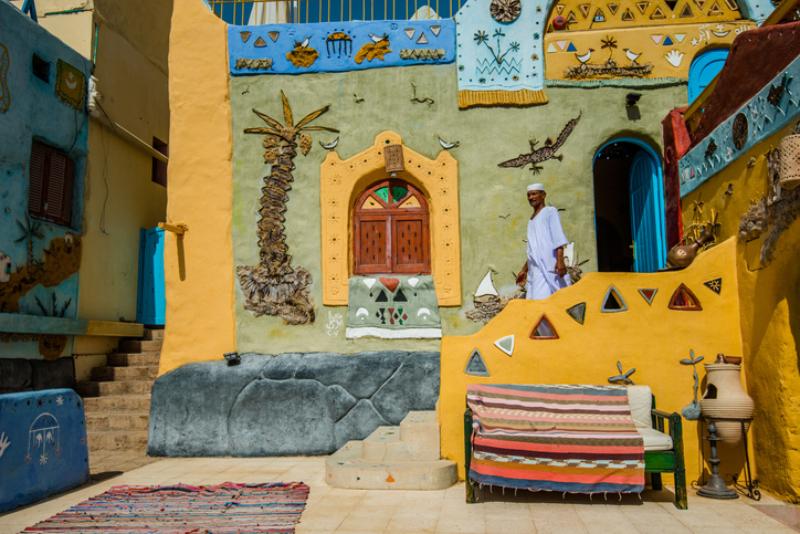
Embarking on a journey through Egypt reveals a tapestry of fascinating cultures, and among them, the rich and vibrant Nubian culture stands out. Nestled along the southern stretches of the Nile, Nubia is a region that captivates with its history, traditions, and the warm hospitality of its people. As we traveled along the banks of the Nile, we were eager to uncover the mysteries and magic of this ancient culture, which has managed to preserve its unique identity amidst the sands of time.
Nubian culture is a living testament to resilience and adaptability. The Nubians have faced numerous challenges throughout history, from invasions to environmental changes, yet they have retained their cultural heritage with pride. Their story is one of survival and continuity, providing a deeper understanding of the human spirit and its capacity to endure.
When we think of Nubia, the "Land of Gold," we see more than ancient treasures.we see a vibrant civilization rich in spirit, strength, and legacy. Stretching across southern Egypt and northern Sudan, Nubia gave rise to powerful builders, traders, and cultural pioneers. Their influence still echoes in the rhythms of modern Nubian life today.
What fascinates us most is how Nubia and Egypt moved through history trading, clashing, inspiring,but Nubia always kept its unique voice. Learning about Nubia reminds us how deeply resilient this culture is timeless, proud, and still shining through the ages.
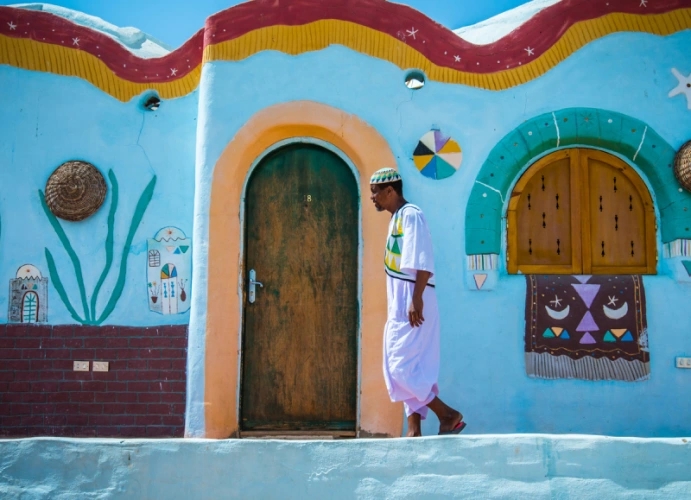
For Nubians, the Nile is far more than a river,it's the heartbeat of their culture. It nourishes the land, connects generations, and keeps traditions alive.
For the Nubians, the Nile is a source of both physical and spiritual nourishment. The river's annual floods once provided fertile soil for agriculture, sustaining villages and enabling the growth of a prosperous civilization. Even today, the Nile's influence on Nubian agriculture is evident, with crops like dates, wheat, and barley forming the backbone of local diets.
The Nile is deeply spiritual for the Nubians, symbolizing life and continuity. It’s a living witness to their history, connecting past and present through tradition and ritual.

Nubian architecture and art are more than just designs to us, they're stories, creativity, and a deep bond to the land. The vibrant homes, with their bold patterns and murals, reflect the spirit and resourcefulness of the Nubian people. Each design blends personal and communal identity, turning everyday life into something beautifully meaningful,and it's moments like these that Egypt tours often bring to life.
Nubian architecture truly amazes us with its use of natural materials. The traditional mud brick homes, crafted with care, not only reflect sustainability but also offer a perfect shield against the harsh climate. The domed roofs and wind-catching features show an incredible understanding of living in harmony with nature,an elegant balance of beauty and function.

Nubian cuisine is a true celebration of flavor and tradition. Each dish, made with fresh local ingredients and rich spices, tells a story of the region’s cultural heritage. When we tried it, I was amazed by the perfect balance of taste and aroma, a true reflection of the Nubian people’s culinary artistry.
Nubian cuisine has a comforting simplicity that we truly enjoy. Staples like sorghum and millet come together in dishes like kisra, a soft flatbread, and asida, a savory porridge. Paired with rich stews full of vegetables, legumes, and sometimes meat, each meal feels nourishing. The spices cumin, coriander, and fenugreek bring a depth to the flavors that’s both satisfying and unforgettable.
When we think of Nubian cuisine, we can’t help but smile at the warmth of communal dining. Meals are shared with family and friends, turning food into a celebration of togetherness. As we sat down to enjoy a Nubian feast,we felt the genuine hospitality of my host's food became a way to strengthen bonds and share joy, reminding us of the true meaning of connection.
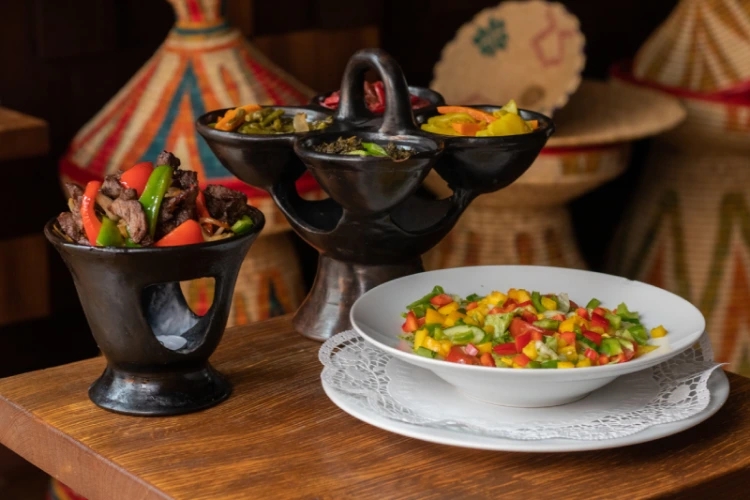
Festivals and celebrations are the heartbeat of Nubian life, where the community comes together to honor their shared culture. One of the most beautiful celebrations is the Nubian wedding, a multi-day event filled with music, dance, and rich traditions. It's more than just a personal milestone, it’s a celebration of family, community, and the timeless values that bind everyone together. Each moment felt like a joyful reminder of what it means to be connected.
The harvest festival holds a special place in Nubian culture, marking the end of the agricultural season with gratitude and joy. It's a time to reflect, give thanks, and celebrate the land’s bounty with traditional dances, songs, and feasts. Participating in these festivals, we felt the powerful sense of community that binds the Nubian people together. It was a beautiful reminder of the strength found in tradition and shared connection.
Music and dance are at the heart of Nubian culture, speaking volumes without words. The rhythmic beats and soulful melodies, played on instruments like the tambour and oud, carry the spirit of Nubia’s past while embracing modern influences. As I listened, I could feel the music resonate with my soul, a living testament to the energy and joy that defines Nubian life.
Nubian dance is a vibrant celebration of life, full of energy and grace. Every movement tells a story whether it’s about love, harvest, or history. During festivals and gatherings, these dances bring the community together in shared joy and pride. For the Nubians, music and dance are more than just entertainment; they’re a way to keep their heritage alive and pass it on. Watching a dance performance, we felt a deep connection to their history, one that transcends time and speaks to their resilience.
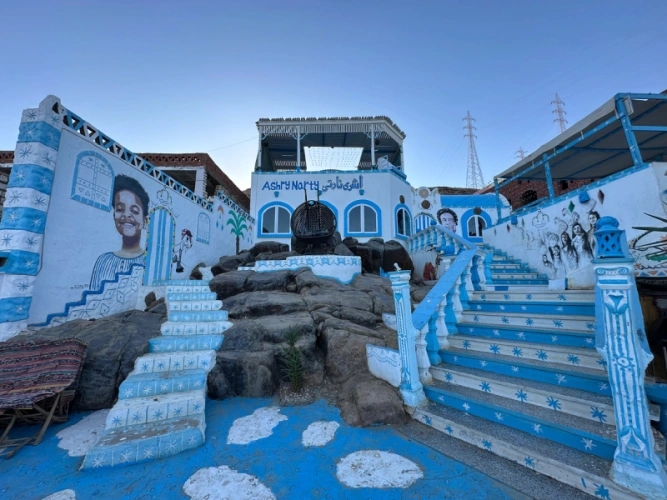
In a world that’s always changing, we believe preserving Nubian heritage matters more than ever. As Egypt moves forward, it’s heartening to see efforts both local and global working to keep Nubian culture alive. From festivals to language programs, these initiatives don’t just protect traditions, they empower the Nubian people to proudly share their story. For us, celebrating Nubia is about honoring resilience, creativity, and a legacy that continues to inspire.
Visiting Nubian culture as a tourist is a true journey of discovery,an invitation to dive deep into the traditions and warmth of the Nubian people. To truly experience it, we’ve learned it’s all about connecting with the community and stepping into their world.
A visit to a Nubian village is a must. The vibrant homes and friendly faces offer an authentic glimpse into their daily lives. As we strolled through the streets, we saw artisans crafting beautiful pieces that tell stories of their rich heritage. It’s an experience we’ll never forget.
Sharing a traditional Nubian meal is one of the best ways to truly connect with the culture. We’ve had the privilege of being welcomed into families' homes, where we tasted delicious local dishes and learned about their customs. It’s not just about the food,it’s about building meaningful connections and sharing stories.
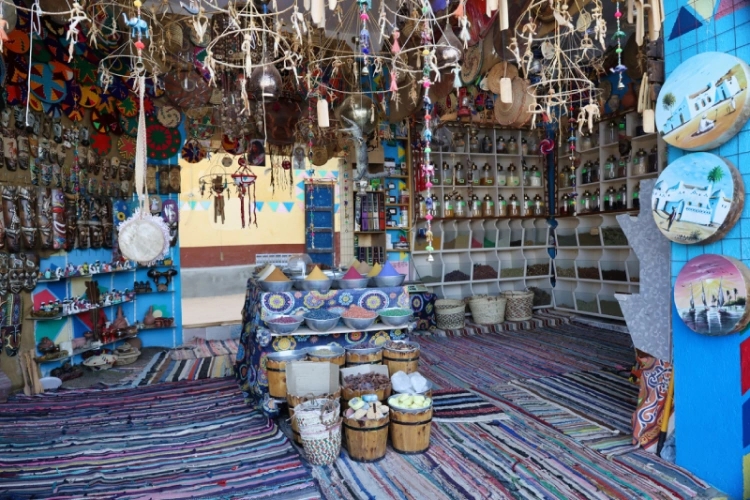
As our journey along the Nile comes to an end, we find ourselves deeply moved by the beauty and resilience of Nubian culture. This exploration has been more than just a trip through a region; it's been a heartfelt journey into the heart of a people whose history and traditions continue to captivate and inspire.
The magic of Nubian culture lies in its ability to connect us to the past while offering a vision for the future. It's a reminder of the enduring human spirit and the power of cultural heritage to shape our identities and communities.
Ready to experience the warmth, rhythm, and resilience of Nubian culture firsthand? Let Egypt tours guide you through this unforgettable journey along the Nile,from vibrant villages to ancient traditions.
Q1. What distinguishes Nubian culture from Egyptian culture?
Nubian culture, while intertwined with Egyptian history, has its own unique identity. Nubians have distinct languages, traditions, and artistic expressions. They are known for their colorful architecture, vibrant festivals, and strong family traditions, all of which reflect their deep connection to the Nile River.
Q2. Are Nubian traditions still practiced today?
Yes, many Nubian traditions are still alive and vibrant. These include distinctive marriage customs, religious celebrations, and artistic practices. Nubian women play a crucial role in preserving cultural heritage through crafts, festive traditions, and culinary practices.
Q3. What are some key features of Nubian architecture?
Nubian architecture is characterized by distinctive mud-brick homes with curved or dome-shaped roofs, designed to cope with the Saharan heat. These homes often feature vibrant colors and geometric patterns that have roots dating back thousands of years, reflecting the Nubians' artistic heritage and connection to their environment.
Q4. How has the Nubian language evolved over time?
The Nubian language, which formed in the 6th century based on the Coptic alphabet, has evolved into multiple dialects including Nobiin, Kenzi, and Andáandi. While Arabic is widely spoken as a second language, efforts are being made to preserve and promote Nubian languages as a crucial part of cultural identity.
Q5. What role does music play in Nubian culture?
Music is an integral part of Nubian culture, playing a significant role in celebrations and daily life. Traditional instruments like drums and flutes accompany various festivities, including weddings and religious ceremonies. Nubian songs and rhythms are a powerful expression of cultural identity and often tell stories of their history and connection to the Nile.
Q6. Where is Nubia located in Egypt?
Nubia is located in southern Egypt along the Nile River, near the border with Sudan.
Q7. What is unique about Nubian culture?
Nubian culture is known for its vibrant traditions, distinct language, colorful architecture, and strong sense of community and heritage.
Q8. Why is the Nile River important to Nubians?
The Nile is essential to Nubian life for agriculture, transportation, spiritual beliefs, and as a cultural symbol of continuity.


© Copyright 2025 Get Egypt Tour. All rights reserved.